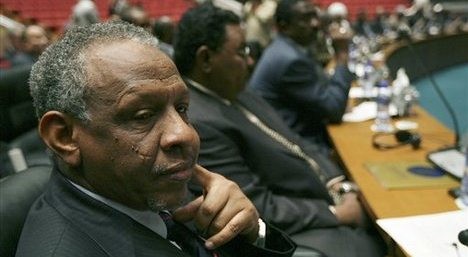A thinktank yesterday released a press statement and accompanying 28-page report on the Sudanese regime’s political situation in light of the arrests of high-ranking former and current officials one week ago. The analysis is not attributed to a named author but rather to the organization on the whole.
The report notes that ruling party leaders have disagreed with each other in respect to how to deal with the rebellions in the provinces, among other issues. International Crisis Group, the Brussels-based organization responsible for the report, places President Bashir and his close advisor Nafie Ali Nafie in one camp, and Vice President Ali Osman Taha and the ex-security chief Salah Gosh (now arrested) in another camp, in respect to the debate over how to deal with the uprisings.
The report observes that an “efficient coup” from the army high command is unlikely, but speculates that Bashir lacks support among junior officers, noting also that many of the other top insiders have their own loyalists in the security organs. A coup initiated by Islamist officers from lower-level units “could quickly lead to chaos, not only in Khartoum, but also the rest the country.”
Press release by International Crisis Group:
Last week’s arrests of senior security figures for allegedly plotting a coup showed how close Sudan is to even greater violence and disintegration. Only managed but fundamental governance reform can help it escape chronic conflict and humanitarian misery.
Sudan: Major Reform or More War (pdf), the latest report from the International Crisis Group, explains why the “Sudan Problem” did not go away with the South’s secession last year. Civil war, driven by concentration of power and resources in the centre, continues to plague the country. The report analyses why the only solution is a more inclusive government that addresses the peripheries’ main grievances.
“A key hurdle – though not the only one – is President Omar Hassan al-Bashir. He has further concentrated authority in a small circle of trusted officials and is unwilling to step aside”, says EJ Hogendoorn, Crisis Group’s Horn of Africa Project Director. “Many hope for regime change via coup or military overthrow but have not considered the dangers”.
The regime in Khartoum is in crisis, faced with multiple challenges that profoundly threaten its existence and Sudan’s stability. The economy is in a freefall that any oil deal with South Sudan would only slow, not stop. Members of the ruling National Congress Party (NCP) are deeply unhappy with the leadership, its policies and massive corruption. Feuding factions within it and within the closely linked Islamic movement are jockeying to present an acceptable alternative. At the same time, political opposition forces are growing more assertive, and the war with the Sudan Revolutionary Front (SRF) is slowly expanding, bleeding the military dry and draining the treasury.
Bashir and the NCP likely know present dangers are greater than those they survived in the past, but their instincts might be to cut a deal with the fractured opposition and take advantage of the partial settlement with South Sudan to resume the oil flow. That can at best buy a little time, not resolve the causes of chronic conflict or stop a spreading civil war.
The regime must reach its own conclusion that today’s crisis requires a more radical approach if Sudan is to escape its downward spiral. But if that happens, the international community should play an important role in persuading it to move in a more constructive direction by offering incentives – political, economic and legal – tied to the meeting of agreed, specific benchmarks that make a transition sustainable and irreversible.
Cooperation with a president who has been indicted by the International Criminal Court and a regime that has been consistently ruthless over nearly a quarter century in power would be controversial. The international community should learn the lessons of past failed settlement initiatives, however: Sudan needs a truly comprehensive peace agreement, not a partial settlement, and the NCP needs to be part of any transition. Leaving it in the cold would be costly. Its elites are too powerful to ignore, and the opposition is too divided and inexperienced to rule alone. A comprehensive solution and genuine political reform, including national reconciliation, with the NCP on board, is the only way out of the trap.
“Bashir is crucial to a managed transition incorporating the NCP and opposition – civil and armed – that could put Sudan on an inclusive, sustainable path”, says Africa Program Director Comfort Ero. “The alternative would be to continue the status quo, with the NCP clinging to power at great humanitarian cost and the opposition pursuing a military strategy that risks more national fragmentation”.
Photo: Nafie Ali Nafie, foreground, and Salah Gosh, background.




